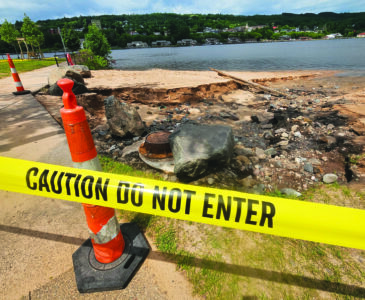Governor acted within Michigan law
LANSING — Governor Gretchen Whitmer’s granting herself an extension of emergency powers without legislative approval is legal, according to a number of Michigan legal experts, including a downstate corporate attorney.
Roger Kershner, based in Royal Oak, said, in an email to the Daily Mining Gazette, that the issue is complicated, because of the number of executive orders issued since March 10. Additionally, there are two statutes in play, as well as two political parties.
The first statute is the Emergency Powers of Governor, Act 302, of 1945. Under this act, the governor is authorized “to proclaim a state of emergency, and to prescribe the powers and duties of the governor with respect thereto; and to prescribe penalties.”
The second statute is the Emergency Management Act, 390, of 1976, which provides for “planning, mitigation, response, and recovery from natural and human-made disaster within and outside this state; to create the Michigan emergency management advisory council and prescribe its powers and duties; to prescribe the powers and duties of certain state and local agencies and officials; to prescribe immunities and liabilities; to provide for the acceptance of gifts; and to repeal acts and parts of acts.”
It also allows for a period of 28 days in which to fulfill the requirements of the act, at the end of which, the governor must request an extension of emergency powers if required to fulfill the obligations of the act.
While the two acts are similar, as Kershner pointed out, the 1976 Act 390 does not amend or repeal Act 302 of 1945. The 28-day limit, therefore does not apply to an act of governor taken pursuant to Act 302 of 1945.
When the first two positive cases of COVID-19 in Michigan were reported on March 10, Whitmer proclaimed a State of Emergency, in accordance with Act 302, as well as pursuant to Act 390.
With the emergency powers granted the governor under Act 390 set to expire at 12:01 on May 1, pursuant to that Act, she requested a 28-day extension. However, the request was for Act 390 only. Act 302 of 1945 does not expire until the governor declares the emergency or disaster at an end.
On April 30, the governor’s request the extension of Act 390 of 1976, was denied by the legislature. In response to the denial, the governor’s office published a statement saying: “Today, after the Republican-controlled Michigan Legislature refused to extend the emergency and disaster declaration that was set to expire at midnight tonight, Governor Gretchen Whitmer took swift action by signing three new executive orders to continue fighting COVID-19 and save lives.”
The statement also said that the executive orders “cite extensive data validating the existence of an emergency and disaster across the State of Michigan.”
While COVID-19 initially hit southeast Michigan hardest, the statement went on to say, the spread is now increasing more quickly in other parts of the state. For instance, cases in some counties in western and northern Michigan are now doubling every six days or faster.
• Executive Order 2020-66 terminated the original emergency declaration of March 10, as stipulated in the 1976 EMA Act.
“That order required legislative approval after 28 days to maintain it in force,” Kershner explained.
Part of the Act 390 stipulates that “the state of disaster shall continue until the governor finds that the threat or danger has passed, the disaster has been dealt with to the extent that disaster conditions no longer exist, or until the declared state of disaster has been in effect for 28 days.”
After 28 days, the governor “shall issue an executive order or proclamation declaring the state of disaster terminated,” unless a request by the governor for an extension of the state of disaster for a specific number of days is approved by resolution of both houses of the legislature.”
• Executive Order 2020-67 clarified that a state of emergency remains in effect under the Emergency Powers of the Governor Act of 1945. The order is effective immediately and continues through May 28, 2020 at 11:59pm) which is pursuant to the Emergency Management Act of 1976.) The governor will evaluate the continuing need for this order prior to its expiration, and “if she determines that an emergency no longer exists, will terminate or extend the state of emergency declared in this order” (as permissible under Act 302).
“EO 2020-67 extended, until May 28, the state of emergency issued under the 1945 law that has no similar requirement of concurrence by the legislature,” Kershner said.
• Executive Order 2020-68, declared a state of emergency and a state of disaster across the State of Michigan, under the Emergency Management Act of 1976.
“The state of emergency and state of disaster declared by this order will be effective through May 28, 2020 at 11:59 p.m.,” the executive order states, “and the governor will evaluate the continuing need for the order prior to its expiration, terminate the states of emergency and disaster if the threat or danger has passed.”




